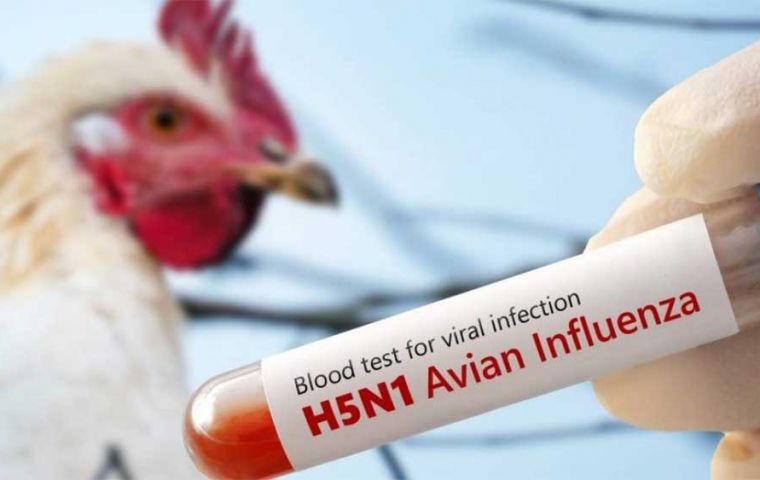MercoPress. South Atlantic News Agency
Uruguayan authorities warn of dangers of avian influenza
 The only case detected so far in the region was the one reported in mid-May in the Brazilian State of Rio Grande do Sul
The only case detected so far in the region was the one reported in mid-May in the Brazilian State of Rio Grande do Sul Uruguay's Public Health Ministry (MSP) issued Sunday a series of recommendations to keep avian influenza from spreading to humans.
Given that the malady is primarily transmitted through contact with sick birds or contaminated surfaces, the authorities insisted on using personal protective equipment for poultry workers; minimizing contact with domestic/wild birds and contaminated surfaces; avoiding touching the mouth, nose, or eyes after contact with birds, mucus, or feces; ensuring poultry, eggs, and meat are thoroughly cooked to prevent infection; avoiding cross-contamination by using separate tools for raw and cooked poultry; washing hands with soap after handling raw poultry or eggs; not consuming animals that were sick or died suddenly; and reporting sick or dead poultry to authorities.
Though rare, human infection can occur. Symptoms include fever (>37.8°C), chills, red/watery eyes, body/muscle pain, diarrhea, cough, sore throat, headache, and difficulty breathing. Those exposed to birds should seek medical attention if symptoms appear.
Brazil
Meanwhile, China expanded its embargo on Brazilian poultry due to the avian influenza case detected on May 16 in Rio Grande do Sul. Initially limited to chicken meat, the ban now includes all poultry derivatives. Brazil, the world’s largest poultry exporter, sent 562,200 tons to China in 2024, making this a significant economic blow.
Brazil restricted exports from Rio Grande do Sul globally and implemented containment protocols. While 20 countries and the EU suspended imports from the region or the entire country, China’s ban now covers all Brazilian poultry products, impacting producers and exporters.
The only case of avian influenza confirmed so far was detected in a commercial farm in the municipality of Montenegro, in the southern state of Rio Grande do Sul near Porto Alegre. Some twenty countries have suspended purchases from all their suppliers in Rio Grande do Sul, while the United Arab Emirates and Japan have limited their restrictions to the affected municipality. The European Union and 23 countries, including China, maintain the suspension for chicken meat produced anywhere in Brazil.




Top Comments
Disclaimer & comment rulesCommenting for this story is now closed.
If you have a Facebook account, become a fan and comment on our Facebook Page!